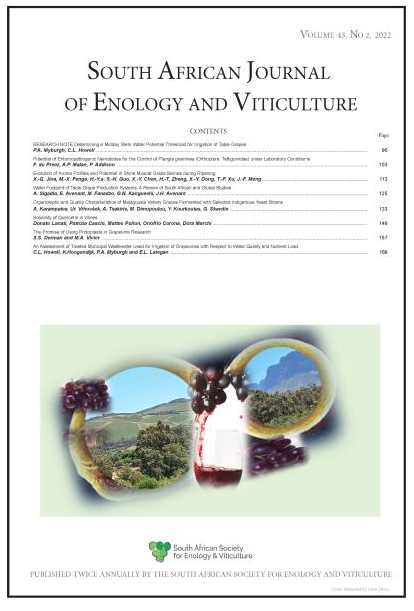An Assessment of Treated Municipal Wastewater Used for Irrigation of Grapevines with Respect to Water Quality and Nutrient Load
Assessment of TMW for vineyard irrigation
DOI:
https://doi.org/10.21548/43-2-5466Abstract
The impact of treated municipal wastewater (TMW) irrigation on soil and grapevines was assessed under field conditions in vineyards in the Coastal region of South Africa. Grapevines were irrigated using TMW from the City of Cape Town uninterruptedly over a period of 11 years. Grapevines were either rain fed, irrigated with TMW via a single dripper line, or received twice the volume via double dripper lines. The quality of the TMW used for vineyard irrigation was acceptable, and below the minimum criteria stipulated by the General Authorisations to irrigate up to 500 m3 per day in terms of pH, ECw and SAR. Mean Na+ concentration in the TMW exceeded the critical value of 100 mg/ℓ for irrigating grapevines in South Africa. The Cl- levels in the TMW were well below the threshold value of 700 mg/ℓ at which toxicity in grapevines might occur. Consistently high P concentrations measured in the TMW could lead to the formation of algal blooms in water storage facilities and bio-fouling of irrigation equipment. The low N content in the TMW could not supply the annual N requirement of grapevines. The annual amount of P applied via the single dripper lines was slightly below grapevine requirements, whereas double the TMW irrigation applied excessive amounts of P. Amounts of K+ applied via TMW irrigation was in excess of annual grapevine requirements, which could affect wine quality negatively. The amount of Ca2+ and Mg2+ applied via the TMW also exceeded annual grapevine requirements.
Downloads
Downloads
Published
How to Cite
Issue
Section
License
A copyright form will be e-mailed to the corresponding author when the manuscript has been accepted for publication.
In principle, the Author agrees to the following when he/she signes the copyright agreement:
I hereby assign to the SOUTH AFRICAN SOCIETY FOR ENOLOGY AND VITICULTURE (SASEV) the copyright of the text, tables, figures, supplementary material, illustrations and other information (the Material) submitted with the manuscript to be published in SOUTH AFRICAN JOURNAL OF ENOLOGY AND VITICULTURE (SAJEV) (the "Article"). The copyright becomes effective from the date the Article has been accepted for publication in SAJEV.
This is an open access journal, and the authors and journal should be properly acknowledged, when works are cited.
Author's may use the publishers version for teaching purposes, in books, theses, dissertations, conferences and conference papers.
A copy of the authors' publishers version may also be hosted on the following websites:
- Non-commercial personal webpage or blog.
- Institutional webpage.
- Authors Institutional Repository.
The following notice should accompany such a posting on the website: This is an electronic version of an article published in SAJEV, Volume XXX, number XXX, pages XXX - XXX, DOI. Authors should also supply a hyperlink to the original paper or indicate where the original paper (www.journals.ac.za/index.php/sajev/) may be found.
Authors publishers version, affiliated with the Stellenbosch University will be automatically deposited in the University's Institutional Repository SUNScholar.
Articles as a whole, may not be re-published with another journal.
The following license applies:
Attribution CC BY-NC-ND 4.0

